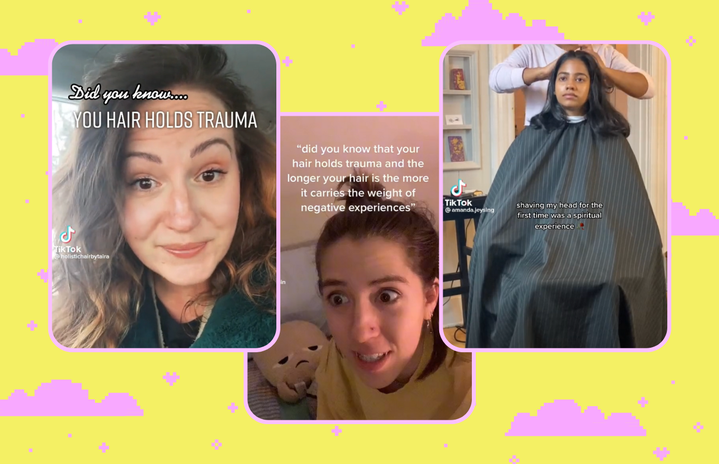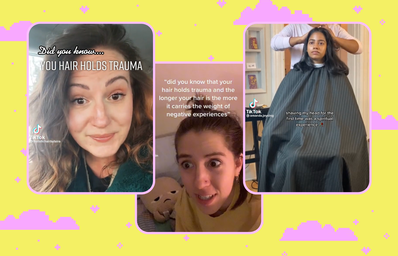Our hair has been with us through it all. You might remember the updo you wore to your first school dance, the braids on your first date, the curls to your high school graduation. Hair holds emotional weight and memories, so much so that cutting it off can be a form of letting go of those memories that hold trauma, and a tool of empowerment.
Recently, the therapeutic chop has been trending on social media. The topic “hair holding trauma” has over 10.9 billion views on TikTok. TikToker Amanda Jey shaved her head as a way to rid herself of past trauma and manifest an era of rebirth. TikToker @holistichairbytaira, who is a holistic hairstylist, shares in a video that the urge to cut your hair after a big life change is actually an intuitive guidance that will help you heal.
Though it might be trending now, the sociology of hair and its impact has been a concept that has been around for years, even decades. In a journal article published in the British Journal of Psychology, “Shame and Glory: A Sociology of Hair,” Anthony Synnott explains that hair is one of the most powerful symbols of identity because it is both personal and public. And in many cultures, hair is a sacred part of us.
For many women, cutting their hair is a rebirth.
Sandra Cooze, a trauma release coach, tells Her Campus, “In many cultures, hair is seen as something sacred, an extension of us. This is especially the case in Native American tribes and in Asia. In those cultures, hair only gets cut in extremely specific circumstances. Native tribes believe that hair holds the energy of the past. Therefore, they do cut their hair only after experiencing significant loss, trauma, death of a close family member, or other significant life-changing events. The cut strands are then treated with the utmost respect by being burnt, buried, or otherwise preserved.”
Hair holds emotional weight, so cutting it off might be a form of shedding that weight. In a Harper Bazaar article, women shared how cutting their hair off after a breakup was cathartic. It was a way to adopt a new identity that wasn’t associated with that time of their lives. For many women, cutting their hair is a rebirth.
Cooze continues, “Hair holds both positive and negative energy. It is an extension of our mind holding our thoughts, emotions, stress, hopes, and fears. Cutting our hair is healthy not only for our hair, but for our overall well-being. Hair grows on average six inches per year. This means that every six inches of hair represents roughly one year of our lives. Many women feel the need for a ‘makeover’ after a breakup, divorce, or other life-altering events. And they usually start with a haircut, unaware of the significance of this step. By giving our hair a trim, or brand new haircut, we not only do something good for our hair, but are also releasing stress, worry, trauma, and so much more.”
In communities of color, the “big chop” is more than just letting go — it symbolizes a transformation into a version of yourself that embraces your natural hair.
Celebrities have often used their hair as a way to stand against societal norms and hateful views in pop culture. For example, women with short hair in movies, shows, or the media have been stereotyped as “tomboys,” and those with long hair have been sexualized or stereotyped as “ditzy.” Female celebs such as Miley Cyrus and Kristen Stewart have chopped off their hair to redefine how the media views them and change these stereotypes.
The idea of “beautiful hair” as we know it today was mainly formed around white women, excluding women of color from the narrative. In communities of color, the “big chop” is more than just letting go — it symbolizes a transformation into a version of yourself that embraces your natural hair. The premise of it is all about taking a stand against societal ideals that view POC’s hair as “not beautiful,” which causes them to chemically treat their hair to straighten it or buy wigs to cover their curls. The “big chop” is when you cut off all the chemically treated parts of your hair to take back that power and show that natural hair is beautiful. In a lot of ways, it’s a redemption.
Kiana Shelton, a licensed clinical social worker, tells Her Campus, “As an African American clinician, I have seen clients cut their hair to serve as the ultimate act of self-love. While there is nothing wrong with having an emotional attachment to your hair, an emotional attachment can be a slippery slope to emotional dependency. Especially if these ideas around your hair begin to impact mood and self-concept.”
Cutting your hair, especially in the queer community, is a way to redefine what it means to be feminine and create a beauty standard that isn’t one-size-fits-all.
Though hair is a part of your identity, it doesn’t have to define you. “Popular neo-soul singer India Arie has a song called ‘I am not my hair.’ This song came in tandem with her cutting her hair in 2006. Some of the lyrics that stand out are ‘I am not my hair, I am not this skin, I am the soul that lives within.’ This song resonated with many, because for years many women have been conditioned to have their hair be a part of how they are seen in the world. For some, cutting their hair can be seen as an affirmative practice, symbolizing one moving away from societal/cultural views or expectations and into the liberation of creating one’s own definition and beauty standard.”
Society’s ideals on hair have also impacted the queer community. Long hair has long been a societal symbol of femininity, and in return, buzz cuts have become a symbol in the queer community for battling heteronormative beauty standards. Cutting your hair, especially in the queer community, is a way to redefine what it means to be feminine and create a beauty standard that isn’t one-size-fits-all.
Physically speaking, hair is just hair, but on an emotional level, it’s so much more than that. It’s a symbol of times in your life, memories, societal views, and emotions. Whether you want to rid yourself of the weight of past trauma or take a stand against gender norms, cutting your hair is a form of letting go. Hair is a part of your identity, so however you choose to wear it (or whether you post it on TikTok) is up to you.


